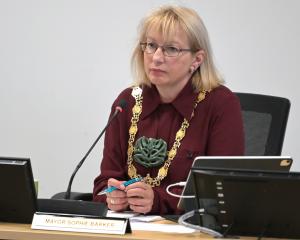
In this case it has been the well-aired concerns about access to colonoscopies for those with symptoms but not necessarily those which meet the criteria being applied by the Southern District Health Board's gastroenterology department.
Southland couple Blair and Melissa Vining are behind the move for the hospital. They have been campaigning for improved cancer care since Blair's diagnosis with terminal bowel cancer last year. The idea is that initially the charity hospital service would provide colonoscopies to those unable to access them through the public system and the hope is that it would then expand to include diagnosis and treatment for other conditions.
It would involve buying a house and installing an endoscopy unit expected to cost about $1.6 million. Clinicians have given support for the project and it has been indicated some big donors are in the wings too.
There are already charitable endeavours in this part of the country helping to fill gaps in access to health services, including the Servants Health Centre and Mercy Hospital's mission and charitable outreach programme, the latter probably best known for its provision of grommet procedures for children and cataract surgery for the elderly.
It is no surprise that among those at the recent meeting in Invercargill to explore the charity hospital was general surgeon Phil Bagshaw.
As well as being the co-author (with gastroenterologist Dr Steven Ding) of the recent controversial report into Southland Hospital surgeons' concerns about colonoscopy access for their patients, he is the man who was instrumental in setting up Christchurch's charity hospital which opened its doors in 2007.
He had long been concerned about the number of people he saw as falling through the cracks of the public hospital system and unable to afford to seek private health care.
He has described it as thinking globally but acting locally.
From humble low-tech beginnings the hospital now boasts state-of-the-art theatres, oral surgery suites and a plethora of consulting rooms. Among services offered are colonoscopy, tubal ligations, abdominal and colorectal surgery, urology, some orthopaedic surgery and counselling.
It is difficult not to have mixed feelings about the Southland proposal. Yes, it is a commendable initiative and it is wonderful to see people so willing to work together to improve services, but why should this be considered necessary?
Colonoscopy will not be the only procedure people may be concerned about in the south. Just last week the ODT published a letter to the editor from a person desperate for a knee replacement but yet to get on to the operating list. This is unlikely to be an isolated case.
One of the issues with current health system planning is that the measures of unmet need are inadequate, something which Mr Bagshaw has been banging the drum about for years.
He does not see gathering information on this should be that difficult, saying it is a case of looking at what DHBs have done and then regularly surveying the national population on what is not done.
In recent years, the National Patient Flow programme has collected data on referrals to specialists in each district health board - the number accepted, declined, not decided and transferred. However, there have been ongoing concerns about the accuracy of the figures. Also, it does not show how many people might not have got as far as a referral to a specialist despite having medical conditions or symptoms, either because they were not seen to qualify for referral or because they were unable to access a general practitioner, due to cost or other barriers.
Better information would hopefully lead to better health service planning. Without that, charity services may provide the only hope for some patients.
Comments
This is a great initiative. Independence from the poor management philosophy and practices that are now endemic in the health service, with political and financial risk considered far greater than patient welfare, is now a necessity for appropriate health care.












